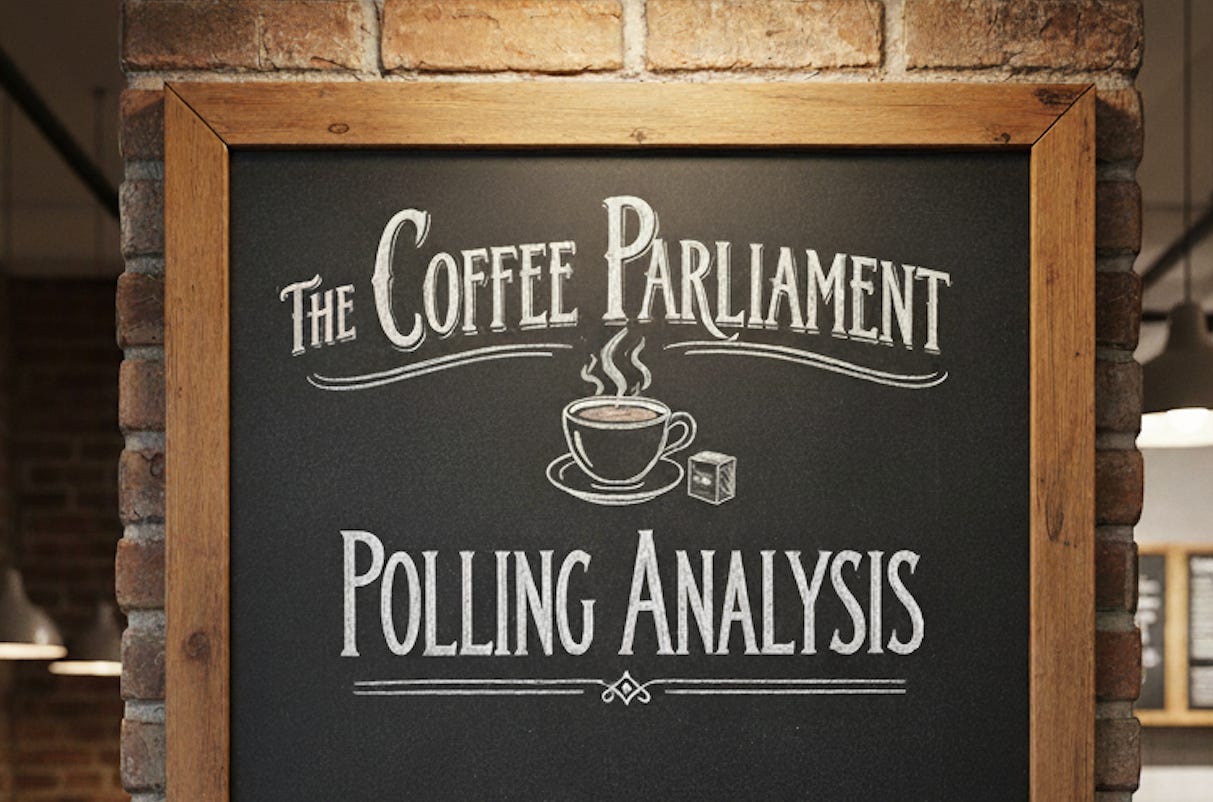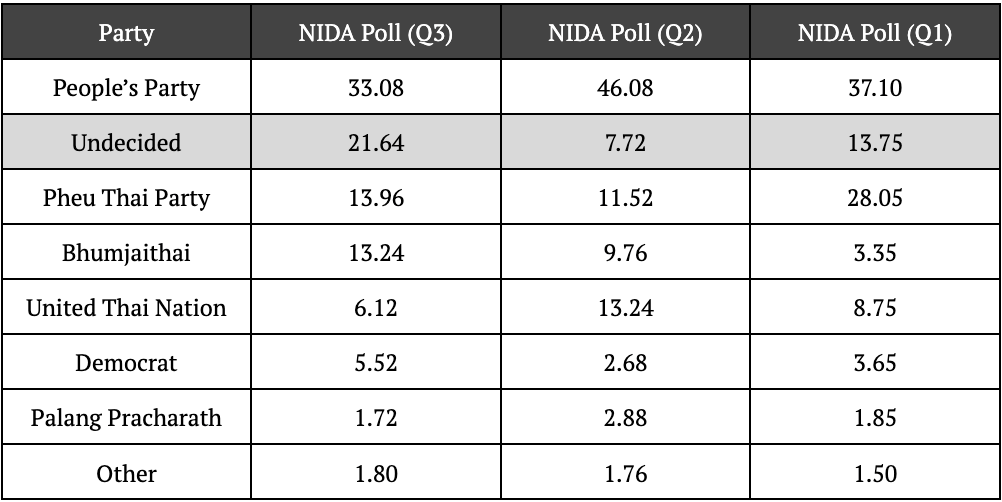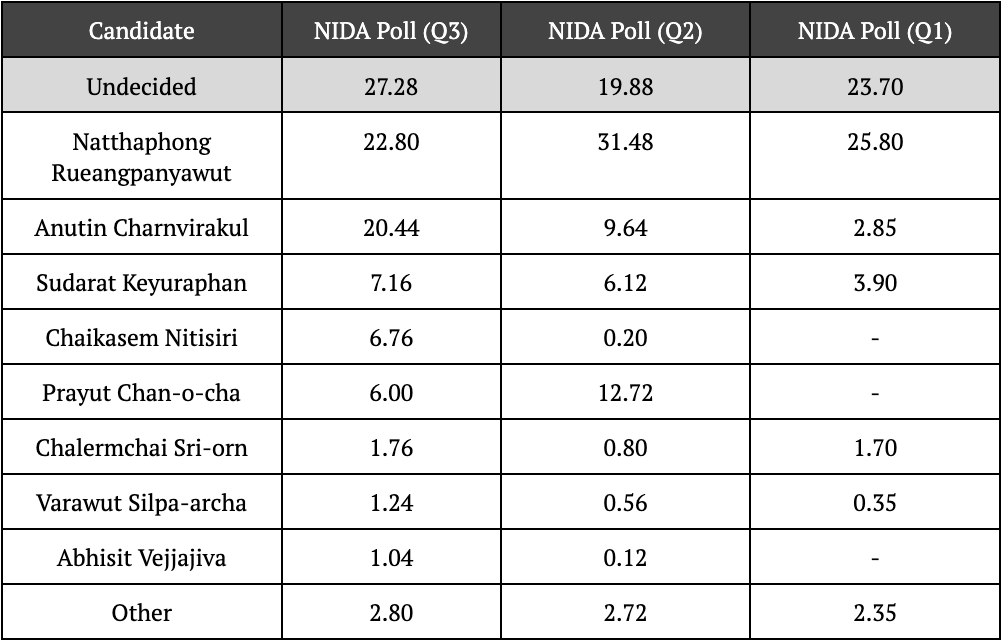Analyzing Initial Polling Results in the Anutin Era
People's Party slumps; Anutin rises; Pheu Thai still yet to recover
We have some new polling conducted after Prime Minister Anutin Charnvirakul was elected by parliament. I think that it’s worth taking a close look at how the numbers have moved, as the political landscape has changed in very significant ways over the past few months.
The latest quarterly NIDA poll was conducted between September 19-24. The results are below:
NIDA Poll — Preferred Party:
NIDA Poll — Preferred Prime Minister:
We also have a recent Suan Dusit Poll that was conducted between 9-12 September which found the People’s Party polling at 23.94%, Pheu Thai polling at 11.61%, Bhumjaithai polling at 14.20%, Palang Pracharath at 10.39% the Democrats at 3.17%, 18.51% selecting other parties, and 21.35% undecided.
My usual caveats about Thai polling apply. By necessity we commit analyst malpractice here by overemphasizing results from just a small number of polls — there is a dearth of reputable political opinion polling. The polls also do a better job of capturing how well a party will do on the party-list ballot rather than the constituency ballot. Some parties will barely register in the polling but still win a lot of seats because of their local strength, which is harder to capture. For reference, in the party-list ballot at the 2023 general election, Move Forward won 37.99 percent of the vote, followed by Pheu Thai at 28.84 percent. The United Thai Nation Party won 12.54 percent and Bhumjaithai won only 2.99 percent.
With all that said, a couple of takeaways below.
1. The People’s Party takes a hit after supporting Anutin Charnvirakul for prime minister.
This is the first data point that we have about how the People’s Party is faring after it struck an agreement with Anutin and facilitated his rise to the premiership. The People’s Party still hold a hefty lead over every other party, according to both the NIDA and Suan Dusit Polls. But a 13 percent decline in the NIDA poll will be difficult for the party to ignore; this is the lowest result they have ever gotten in the NIDA poll since the Move Forward Party was dissolved. We see a similar decline for the PP leader Natthaphong Rueangpanyawut, who has never matched the ex-MFP leader Pita Limjaroenrat’s polling, and has always lagged behind his party in the polls. They seem to have sacrificed the gains they previously made in the wake of former prime minister Paetongtarn Shinawatra’s phone call leak.
Perhaps this was predictable. Although the PP says this was the decision the majority of their party members favored, there must have been a sizable minority who would have preferred the party back Pheu Thai or abstain entirely. While there isn’t a clear PP-like alternative, disaffected voters could also simply stay home. Indeed, it’s worth noting how much the “Undecided” group has increased in the NIDA poll (an increase of 13.92 percent). (With so many still undecided and unconvinced by the available options, there’s a lot of room for movement before the next election). Something that could improve the PP’s chances is their announcement of their prime minister candidates. The PP has signaled that they will be nominating three candidates, unlike in 2023 when they nominated only Pita. It’s possible that these two new candidates, in addition to Natthaphong, could give them a boost.
2. Bhumjaithai is moving towards becoming a true national force.
More people than ever support Anutin as prime minister (from 9.64 percent to 20.44 percent). There a couple plausible reasons. Part of that is incumbency advantage. Most people didn’t really think of Bhumjaithai as a viable core coalition party before the events of the previous month; Anutin becoming prime minister has changed the reality on the ground in ways that is pushing people to think differently about his chances at the next election. There is also the fact that Anutin has emerged as the most credible “conservative choice,” consolidating support from the right. His rise in the opinion polling has simply been meteoric — from barely registering at the start of the year to coming at striking distance of being the most preferred candidate. And finally, the “technocratic appointments” that Anutin has made may have boosted his favorability with the public.
Bhumjaithai’s polling as a party has seen a more modest uptick (from 9.76 percent to 13.24 percent). You could argue that I am overemphasizing Bhumjaithai’s rise here, given that this is only a few percentage points. But in context, this is a noteworthy result because Bhumjaithai has almost never done particularly well in these polls, given that most of their strength in previous elections came from the constituency ballot. At the start of the year, NIDA still had Bhumjaithai in the low single digits! If Bhumjaithai can combine this newfound national popularity with its previous local strength, the party will be a very formidable electoral machine at the next election. We now have a Bhumjaithai that is tied with Pheu Thai (indeed, Suan Dusit has Bhumjaithai ahead) — and with more momentum.
3. Pheu Thai is still in deep trouble and is at risk of being surpassed by Bhumjaithai.
Pheu Thai’s polling hit a nadir in the Q2 NIDA poll. It has recovered slightly by a little over two percentage points. But this is still a deep fall from where they were polling previously (14 percentage points below where they were early in the year!). Suan Dusit has them in third place; NIDA has Bhumjaithai on the verge of supplanting them. The NIDA poll was fully conducted after Thaksin Shinawatra went to prison, so there doesn’t appear to be a notable sympathy surge yet. It’s possible that if the PP stumbles further Pheu Thai could perhaps make further gains, but for now the deficit remains very deep.
We can’t count Pheu Thai out yet, of course. The party has a lot of room to make a lot of noise in opposition. And contributing to the drag on Pheu Thai’s numbers here is the fact that no one actually knows for sure who their next prime minister candidate will be. Former justice minister Chaikasem Nitisiri, despite being the only eligible Pheu Thai candidate remaining, had the support of only 6.76 percent of voters. Once Pheu Thai actually chooses a new frontman for the party, we can more realistically assess Pheu Thai’s chances at the next election.
Additional note: Important to always be cautious about over-interpreting by-election results, but yesterday Pheu Thai lost a by-election in Srisaket’s 5th district to Bhumjaithai. Pheu Thai had won this seat by 9 percentage points in 2023. They triumphed in a Chiang Rai by-election over the People’s Party two weeks ago, but the orange camp has never been very successful at local by-elections. Losing to Bhumjaithai, which is much more capable at a local head-to-head, in a Northeastern stronghold is going to give Pheu Thai’s strategists a discouraging data point.
5. Other observations
The United Thai Nation Party was doing well for a brief moment in June (accompanied by a surprise double-digit result for former prime minister Prayut), but they’ve faded again. Many potential reasons: reports of division in the party, Prayut not actually mounting a comeback, etc. As a small party they could still be viable — party leader Pirapan Salirathavibhaga says he isn’t going anywhere and wants to reboot the party as an option for “people tired of politics” — but they’re not exactly trending in the right direction.
I find the slight uptick in the Democrats’ polling interesting; this is the best result they’ve gotten in the NIDA poll since (I believe) 2023. The poll was conducted after Chalermchai Sri-orn’s resignation as party leader, so perhaps the modest gains were a result of people reconsidering the party under potential new management. (That isn’t being reflected in former prime minister Abhisit Vejjajiva’s personal polling yet, however, but he also hasn’t even officially announced his candidacy for the party leadership).
Kla Tham doesn’t register in the polls here, but that’s not because they’re doing badly but because they are depending mostly on the constituency ballot.
After a cataclysmic month in Thai politics, the polling is starting to shift. We’ll see if these trends continue in the next round of polls as parties begin ramping up for what we for now believe to be an early-2026 general election.





I wonder what the drop in support for the PP would have been had they supported another Shinawatra PT government. I’d hazard a guess it would have been far greater. Like it or not Anutin hasn’t put a foot wrong. If betting were legal in Thailand my money would be on Anutin remaining as PM post election leading a coalition of the conservative parties and PT. I
appreciate the PP were not overburdened with potential coalition parties but their decision not to sully their hands with government was a mistake. Instead they’ve handed the power of incumbency to a far better politician. Who’s scared of an early election now.
So, charismatic leadership matters? At least for PP anyway